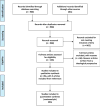A systematic review of religious beliefs about major end-of-life issues in the five major world religions
- PMID: 28901283
- PMCID: PMC5865598
- DOI: 10.1017/S1478951516001061
A systematic review of religious beliefs about major end-of-life issues in the five major world religions
Abstract
Objective: The objective of this study was to examine the religious/spiritual beliefs of followers of the five major world religions about frequently encountered medical situations at the end of life (EoL).
Method: This was a systematic review of observational studies on the religious aspects of commonly encountered EoL situations. The databases used for retrieving studies were: Ovid MEDLINE In-Process & Other Non-Indexed Citations, Ovid MEDLINE, Ovid EMBASE, Ovid PsycINFO, Ovid Cochrane Central Register of Controlled Trials, Ovid Cochrane Database of Systematic Reviews, and Scopus. Observational studies, including surveys from healthcare providers or the general population, and case studies were included for review. Articles written from a purely theoretical or philosophical perspective were excluded.
Results: Our search strategy generated 968 references, 40 of which were included for review, while 5 studies were added from reference lists. Whenever possible, we organized the results into five categories that would be clinically meaningful for palliative care practices at the EoL: advanced directives, euthanasia and physician-assisted suicide, physical requirements (artificial nutrition, hydration, and pain management), autopsy practices, and other EoL religious considerations. A wide degree of heterogeneity was observed within religions, depending on the country of origin, level of education, and degree of intrinsic religiosity.
Significance of results: Our review describes the religious practices pertaining to major EoL issues and explains the variations in EoL decision making by clinicians and patients based on their religious teachings and beliefs. Prospective studies with validated tools for religiosity should be performed in the future to assess the impact of religion on EoL care.
Keywords: Advance directives; Artificial nutrition and hydration; Autopsy; End of life; Euthanasia; Pain management; Religion.
Conflict of interest statement
All the authors have completed the unified competing interest form (see
Figures
References
-
- Aghababaei N. The euthanasia–religion nexus: Exploring religious orientation and euthanasia attitude measures in a Muslim context. Omega. 2012–13;66(4):333–341. - PubMed
-
- Al-Mobeireek AF. Physicians’ attitudes towards “do-not-resuscitate” orders for the elderly: A survey in Saudi Arabia. Archives of Gerontology and Geriatrics. 2000;30(2):151–160. - PubMed
-
- Baeke G, Wils JP, Broeckaert B. We are (not) the master of our body”: Elderly Jewish women’s attitudes towards euthanasia and assisted suicide. Ethnicity & Health. 2011;16(3):259–278. - PubMed
-
- Baeke G, Wils JP, Broeckaert B. It’s in God’s hands: The attitudes of elderly Muslim women in Antwerp, Belgium, toward active termination of life. American web of Bioethics Primary Research. 2012;3(2):36–47.
-
- Balboni TA, Vanderwerker LC, Block SD, et al. Religiousness and spiritual support among advanced cancer patients and associations with end-of-life treatment preferences and quality of life. Journal of Clinical Oncology. 2007;25(5):555–560. Available from https://www.ncbi.nlm.nih.gov/pmc/articles/PMC2515558/pdf/nihms58578.pdf. - PMC - PubMed
Publication types
MeSH terms
Grants and funding
LinkOut - more resources
Full Text Sources
Other Literature Sources
Research Materials


